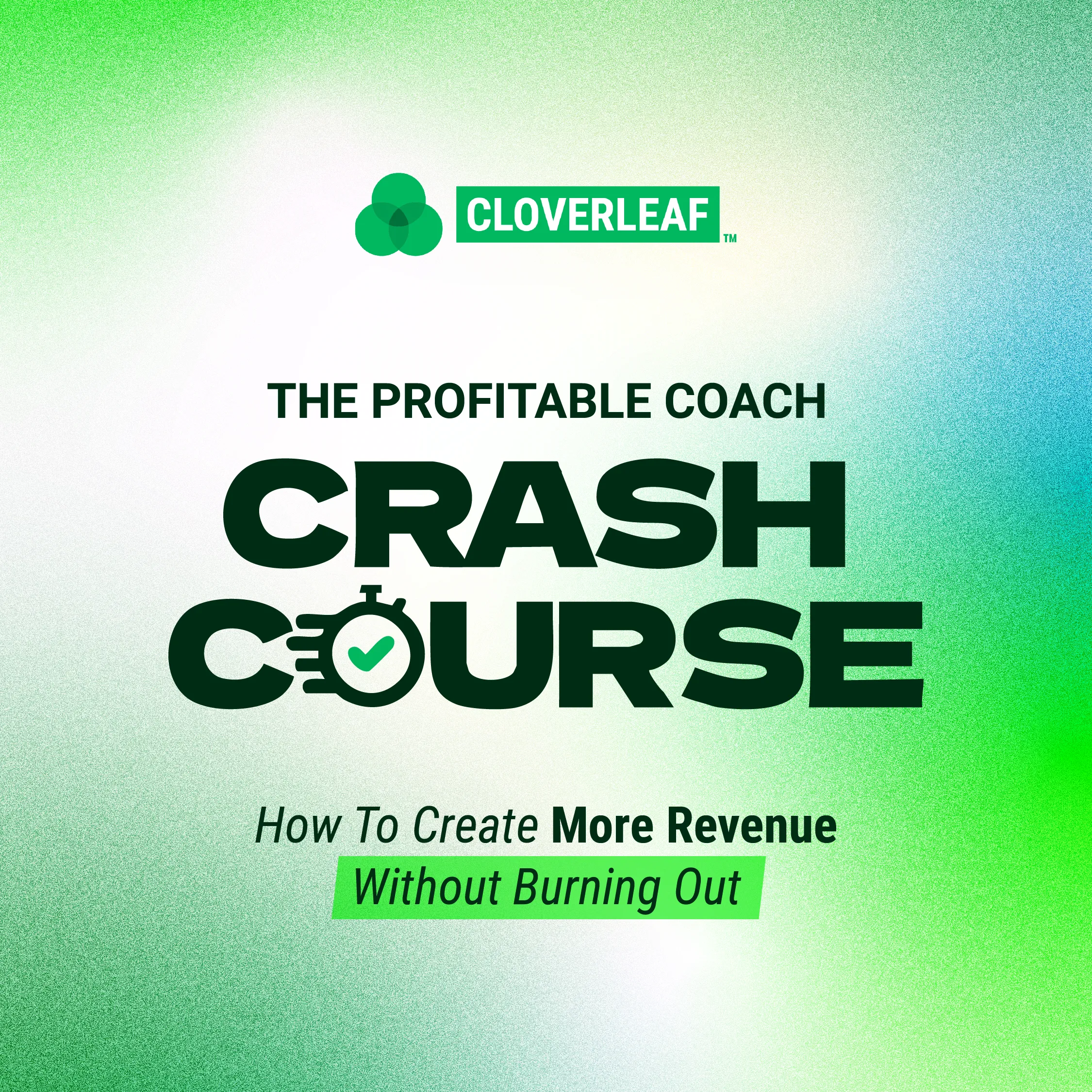Walk into almost any organization, and you’ll find a shelf—or a shared drive—filled with personality reports from a team-building day long forgotten. DISC, Enneagram, MBTI, Working Genius—you name it. Leaders loved the workshop, people remembered their “type,” and then… nothing.
This isn’t because the tools don’t work. It’s because the insight isn’t embedded into how people actually work.
Assessments often spark awareness, but awareness isn’t enough. If there’s no follow-up structure, no reinforcement, and no connection to day-to-day behavior, the potential fades fast.
And that’s the opportunity.
For coaches, consultants, and facilitators, assessments don’t just have to be a one-time event or a slide deck add-on. They can be the foundation of scalable, high-impact coaching products—the kind that support growth between sessions and create lasting client value.
In this article, we’ll show you how to make that shift. Based on a recent Cloverleaf webinar, we’ll unpack how to:
- Use assessments to deliver real behavior change—not just insight.
- Create repeatable coaching programs that scale without burnout.
- Turn “a single session” into an ongoing client relationship.
You don’t need to add more to your client’s calendar. You need to meet them in the one they already use.
Get the High Impact Coach Crash Course to see how to build a coaching business that delivers more value, serves more clients, and grows more revenue without burning you out.
Why Most Coaches Struggle To Deliver ROI & Follow-Through With Assessments
Assessments are one of the most widely adopted tools in leadership and team development. But despite their popularity—and the budgets behind them—most of their value never gets realized.
According to a 2024 report from ATD, only 18% of organizations say they fully leverage assessment data after the initial debrief.
That means in more than 80% of cases, the insight stops where the report ends.
Why?
Because the infrastructure for using the insight isn’t there.
Here’s what gets in the way:
- Leaders don’t know what to do with the data. A 20-page PDF doesn’t translate into action. Especially when the only guidance they received was during a one-time workshop.
- Workshops aren’t connected to daily work. Even excellent facilitators can’t force relevance. Without a clear path to integrate insight into meetings, feedback, and collaboration, it fades.
- There’s no follow-up mechanism. If nothing reinforces the learning, it gets lost to the noise of the workweek.
As one coach in our webinar put it, “It’s not that the tools fail. It’s that we stop short of behavior.”
And that’s the core insight: Awareness doesn’t drive behavior. Repetition and reinforcement do.
Until clients see the connection between assessment insight and their everyday choices—how they run meetings, give feedback, handle conflict—they’ll never get the ROI they hoped for.
Shift your coaching business from hourly billing to predictable revenue
Ready to finally move beyond hourly limits? Let’s start building your profitable coaching business today

A 3-Part Framework for Turning Insight Into Lasting Impact
Most coaches stop at awareness. The great ones build infrastructure for change.
Stephanie Lacata, a senior learning strategist and longtime practitioner, introduced this simple but powerful framework in our recent webinar. It’s designed to help coaches move beyond the debrief—so insights actually drive behavior.
Here’s how it works:
1. Educate: Spark Shared Language
Assessments like DISC, Enneagram, and 16 Types create a common framework for understanding behavior.
Whether it’s “She’s a high C” or “That’s his 7 energy showing up,” the shared language reduces judgment and creates space for curiosity.
But that initial clarity is only the beginning. Shared language is a starting point—not a strategy.
Without something more, even the stickiest language fades into novelty.
2. Embed: Reinforce in the Flow of Work
This is where most coaching products break down. They assume insight will last without reinforcement.
But what happens when clients go back to overflowing inboxes and standing meetings?
The data shows: they forget. Fast.
Instead of asking clients to recall insights, bring those insights to them—right when they need them.
Assessment platforms like Cloverleaf can deliver personalized nudges, right where decisions happen. Before meetings, in calendar invites, inside Slack threads. Not after the moment passes.
Daily nudges, customized by assessment data, can appear in email, calendar invites, or Slack—before a meeting, performance review, or tough conversation.
This makes insight actionable. And repeatable. If insight isn’t applied in daily work, it doesn’t matter how accurate the assessment is—it won’t lead to better decisions.
3. Evolve: Build a System for Growth
Once assessment insights are embedded in workflow, they become a foundation for deeper development.
This might look like:
- Leadership sprints based on team dynamics
- Quarterly coaching check-ins tied to behavior patterns
- Conflict playbooks personalized by type and motivators
- Custom prompts for performance conversations
It shifts coaching from a series of one-offs to a consistent developmental rhythm.
Insight fades fast if it isn’t reinforced. Without a system to apply it daily, assessment data gets forgotten—not used.
When clients evolve how they use insight, you evolve your value as a coach, from vendor to strategic partner.
How One Coach Used Cloverleaf to Reinforce Learning Between Sessions
So what does it actually look like to turn assessments into scalable coaching assets?
In my work with a large hospitality organization, I led a coaching program that reached over 200 leaders, without adding more sessions. Using Cloverleaf, I was able to reinforce learning between workshops, deepen team trust, and drive real behavior change.
Coaching Skills for Leaders Program
Over two years, Stephanie led a leadership development initiative across a large hospitality organization. The program reached more than 200 leaders through five cohorts, from executives to frontline managers.
But here’s what made it scalable:
- Sessions were just 60 minutes every other week. No full-day workshops, no intensive retreats.
- Cloverleaf was embedded throughout. Participants received personalized coaching nudges—based on their assessment results—in between sessions.
These nudges showed up where they already worked: in inboxes, calendars, and coaching dashboards.
And the result?
Leaders didn’t just learn new skills—they actually used them.
The Impact of Embedded Coaching Nudges
Participants reported:
- Greater confidence navigating conflict, thanks to tips tailored to each teammate’s communication style.
- More effective feedback conversations, customized by DISC, 16 Types, and Enneagram insights.
- Stronger trust and team connection—without adding extra sessions or content.
They weren’t carrying around PDFs or trying to remember a one-time workshop. They were getting contextual prompts that turned knowledge into action.
The nudges weren’t replacing the coaching, they were reinforcing it.
When insight surfaces at the exact moment it’s needed; before a meeting, during a 1:1, or in the middle of a tough conversation, it can drive meaningful behavior change. Coaching can become continuous, even when the coach isn’t in the room.
Ready to see how Cloverleaf could reinforce your coaching impact, without adding more sessions?
Take the self-guided tour and explore how automated coaching nudges, embedded insights, and assessment-backed support can help you scale your practice and stay present in your clients’ most critical moments.
👉 Take the Tour Below
How to Position and Price Coaching for Ongoing Value
One of the biggest mindset shifts for coaches? Stop thinking in hours. Start thinking in outcomes.
During the webinar, Stephanie challenged a common trap: pricing coaching like a freelancer—session by session. When coaches do this, they cap their income and their impact.
Don’t Sell a Workshop. Sell a Transformation.
Instead of a 90-minute session, offer a 90-day development journey. Cloverleaf makes this possible—by continuing the coaching after you log off.
Here’s how to reposition your offer:
- Lead with the outcome: What behavior will change? What business pain are you solving?
- Use Cloverleaf as the infrastructure: Daily nudges, insight libraries, and coaching prompts keep development alive between sessions.
- Anchor in value, not presence: You don’t need to be there every day for your coaching to make a daily impact.
Offer Tiered Packages That Scale With Client Needs
A flexible, productized offer might include:
- Tier 1: Insight Access
- Cloverleaf + assessments + daily nudges
- No live coaching—great for low-touch programs or internal leader development
- Tier 2: Guided Growth
- Access + group workshops or cohort-based learning
- You facilitate key moments, Cloverleaf sustains momentum
- Tier 3: Full Partnership
- Access + groups + 1:1 coaching
- Ideal for exec teams or change initiatives
You’re not just selling hours—you’re selling behavior change, business outcomes, and a development experience that lasts.
Stop charging for the hour. Start charging for embedded value.
That’s what makes your coaching not just scalable, but sustainable.
How to Turn a Single Workshop Into a Scalable Coaching Platform
Most coaching engagements start with a workshop. But they don’t have to end there.
The key isn’t more content. It’s more continuity.
When you use assessments strategically, with tools like Cloverleaf, you can:
- Extend relationships beyond a single contract.
- Deliver measurable behavior change across remote, hybrid, and siloed teams.
- Position yourself as an embedded development partner, not a one-and-done vendor.
In the webinar, Stephanie shared specific ways coaches are turning initial engagements into long-term platforms for growth:
- Seed growth with smart generosity. Offer a trial or gift access to Cloverleaf—just enough to spark curiosity and show value.
- Embed it into your proposal. Don’t line-item assessments. Instead, position them as part of your process for building self-awareness and team trust.
- Use assessment data as a shortcut. When coaching leaders through feedback, conflict, or team dynamics, Cloverleaf insight becomes your fast pass to relevance.
The result?
Leaders don’t just remember your workshop. They experience your coaching in their inbox, calendar, and conversations—every single day.
This is how you move from a one-time event… to an everyday asset.
The Next Era of Coaching Is Embedded, Ongoing, and Always On
Assessments spark awareness.
Coaching sustains growth.
But it’s technology that scales both, without losing the human touch.
Cloverleaf helps coaches extend their impact by embedding personalized insight into daily work. That means less time spent repeating yourself… and more time building momentum that sticks.
Turn your next workshop into a scalable, tech-enabled coaching platform that delivers long-term results, and recurring revenue.
🙋 FAQ
Q: Do I have to be certified in each assessment to use this?
A: No. Cloverleaf makes DISC, Enneagram, 16 Types, and more accessible to coaches—without requiring formal certification. You bring the coaching expertise; Cloverleaf delivers the insight in a usable, client-friendly format.
Q: What if my clients already use other assessments?
A: Great—Cloverleaf builds on what they already know. You’re not duplicating effort—you’re amplifying it, with personalized nudges and team dynamics that bring static reports to life.
Q: Will this replace me as a coach?
A: No. Cloverleaf doesn’t replace coaching—it reinforces it. You’re still the guide. Cloverleaf becomes the daily companion that helps your insights stick between sessions and across teams.







